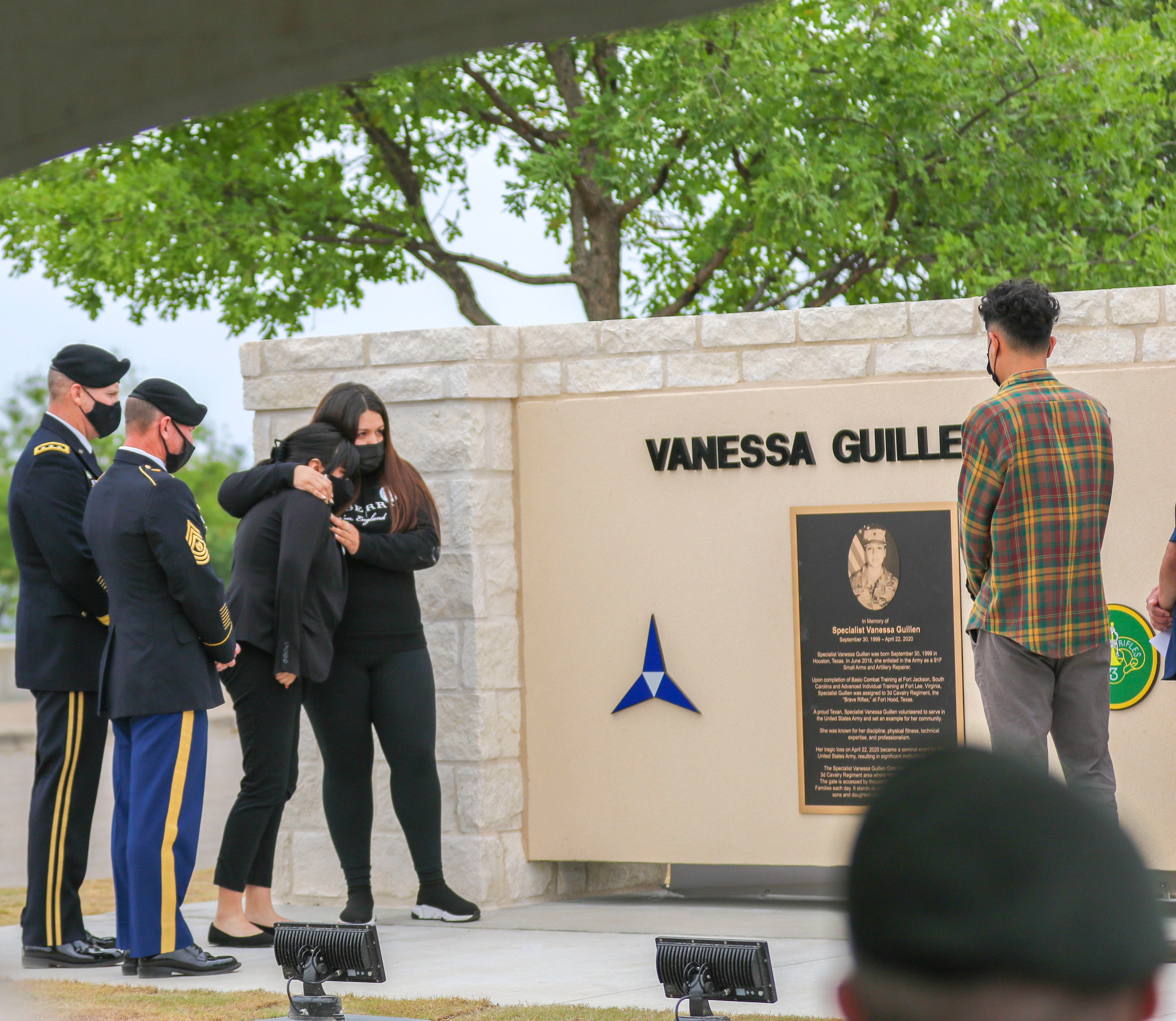A gate at Fort Hood, Texas, leading to the 3rd Cavalry Regiment area where Spc. Vanessa Guillén was killed by a fellow soldier last spring, now bears her name and picture.
Guillén’s two sisters, who spoke after the dedication ceremony Monday, called the gate a reminder of the progress made so far. But the sisters added that more needs to be done to change how the Army prevents sexual harassment in the ranks.
Before she was killed, Guillén told her family she was a victim of sexual harassment but had not reported it to her chain of command for fear of repercussions.
“This is an honor for Vanessa … this is a step in the right direction,” said Mayra Guillen, the older sister. “For me, I try to see things in a positive way. This gate will [remind] all those soldiers who go in day and night that what happened shouldn’t happen ever again.”
The sisters also addressed controversy surrounding the memorial gate, which some have viewed as political damage control after the fallout from Guillén’s brutal death placed Fort Hood under intense scrutiny from Congress, the public and senior military officials.
The 20-year-old Guillén was killed with a hammer April 22, 2020, inside an armory by Spc. Aaron Robinson, who then disposed of her remains along a river off post, prosecutors say. Robinson killed himself with a pistol when confronted by police at the culmination of a two-month search for Guillén.
“A lot of people said positive and negative stuff about the gate. I myself have said it, as well,” said Lupe Guillen, the younger sister. “It had to take my sister’s life for us to realize the bigger issue: Sexual violence is not an ‘issue,’ it’s an epidemic inside the armed forces. And she had to die, she had to be murdered and dismembered and burned, in order for us to realize that this has been happening for decades.”
The Guillen family and their attorney, Natalie Khawam, have said that before Guillen was killed, she was sexually harassed by Robinson, but was afraid to report the incident for fear of reprisal. Army investigators say they were unable to confirm those allegations.

An independent committee of civilian investigators reported in December that the environment at Fort Hood allowed sexual assault and harassment to proliferate for years. The Army has been working to implement recommendations from that report, such as having investigating officers outside a soldier’s chain of command handle sexual misconduct reports.
But Guillen’s sisters said legislation is needed to cement change and remove the soldier’s chain of command from the process entirely.
RELATED

Khawam, the attorney, said there will be push in May to reintroduce the I Am Vanessa Guillen Act — a bill that would move legal decisions on whether to prosecute a sexual offense outside of the existing military chain of command.
“There needs to be reform,” Khawam added. “The momentum is here. We just need to resolve it through legislation.”
Rep. Jackie Speier, D-Calif., first introduced the bill in the House in September, but it remains in committee. Speier, as well as House Speaker Nancy Pelosi, D-Calif., are expected to attend a Thursday event to discuss the legislation and meet with members of the Guillén family.
RELATED

Lt. Gen. Pat White, Fort Hood;s commander, who spoke during the gate unveiling ceremony, said it serves as a reminder of the changes the Army at large is implementing following Guillén’s disappearance and death.
“In coordination with the family, who agreed to allow us to do this, we’re going to dedicate a gate that has her name on it, has her picture. And you can come learn just a little bit about Vanessa,” said White. “But mostly it’s so in two, three, four years, we haven’t forgotten what this is all about, what this moment is about in our history.”
In addition to the Army’s changes to its Sexual Harassment/Assault Response and Prevention program, the service’s top leaders are also planning a redesign of Army Criminal Investigation Command. Proposals obtained by Army Times highlighted options to remodel the command to look more like the Naval Criminal Investigative Service or the Air Force Office of Special Investigations.
Kyle Rempfer was an editor and reporter who has covered combat operations, criminal cases, foreign military assistance and training accidents. Before entering journalism, Kyle served in U.S. Air Force Special Tactics and deployed in 2014 to Paktika Province, Afghanistan, and Baghdad, Iraq.





